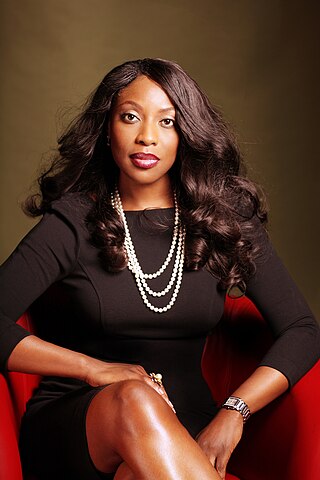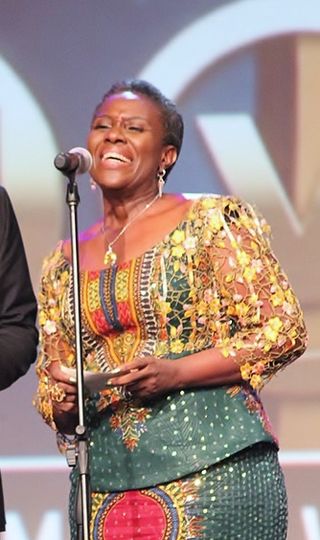
Gretchen Elizabeth Carlson is an American broadcast journalist, writer, and television personality.

Sex trafficking is human trafficking for the purpose of sexual exploitation. It has been called a form of modern slavery because of the way victims are forced into sexual acts non-consensually, in a form of sexual slavery. Perpetrators of the crime are called sex traffickers or pimps—people who manipulate victims to engage in various forms of commercial sex with paying customers. Sex traffickers use force, fraud, and coercion as they recruit, transport, and provide their victims as prostitutes. Sometimes victims are brought into a situation of dependency on their trafficker(s), financially or emotionally. Every aspect of sex trafficking is considered a crime, from acquisition to transportation and exploitation of victims. This includes any sexual exploitation of adults or minors, including child sex tourism (CST) and domestic minor sex trafficking (DMST).

Abubakar Bukola SarakiMBBS is a Nigerian politician who served as the 13th president of the Nigerian Senate from 2015 to 2019. He was elected the President of Nigeria’s 8th Senate on 9 June 2015 under the All Progressives Congress (APC).
Prostitution in Cameroon is illegal but tolerated, especially in urban and tourist areas. In the capital, Yaoundé the main area of prostitution is the neighbourhood of Mini Ferme. UNAIDS estimate there are 112,000 sex workers in the country.

The Victims of Trafficking and Violence Protection Act of 2000 (TVPA) is a federal statute passed into law in 2000 by the U.S. Congress and signed by President Clinton. The law was later reauthorized by presidents Bush, Obama, and Trump. In addition to its applicability to US citizens, it authorizes protections for undocumented immigrants who are victims of severe forms of trafficking and violence.

In the United States, human trafficking tends to occur around international travel hubs with large immigrant populations, notably in California, Texas, and Georgia. Those trafficked include young children, teenagers, men, and women; victims can be domestic citizens or foreign nationals.

Sunitha Krishnan is an Indian social activist and chief functionary and co-founder of Prajwala, a non-governmental organization that rescues, rehabilitates and reintegrates sex-trafficked victims into society. She was awarded India's fourth highest civilian award the Padma Shri in 2016.
Gbemisola Ruqayyah Saraki is a Nigerian politician who served as the Minister of State for Mines and Steel Development of Nigeria since 6 July 2022 till 29th May 2023. She served earlier as the Minister of State for Transportation from 2019 till she was moved by the President to the Ministry of Mines and Steel Development in 2022.

Mosunmola "Mo" Abudu is a Nigerian media mogul, philanthropist, and former human resources management consultant.

Joke SilvaMFR is a veteran Nigerian actress, director, and businesswoman.
In 2009, Niger was a source, transit, and destination country for children and women subjected to trafficking in persons, specifically forced labor and forced prostitution. Caste-based slavery practices, rooted in ancestral master-slave relationships, continued primarily in the northern part of the country. Children are trafficked within Niger for forced begging by religious instructors known as marabouts; forced labor in gold mines, agriculture, and stone quarries; as well as for involuntary domestic servitude and forced prostitution. The ILO estimates at least 10,000 children work in gold mines in Niger, many of whom may have been forced to work. Nigerien children, primarily girls, were also subjected to commercial sexual exploitation along the border with Nigeria, particularly in the towns of Birni N'Konni and Zinder along the main highway, and boys are trafficked to Nigeria and Mali for forced begging and manual labor. There were reports Nigerien girls entered into "false marriages" with citizens of Nigeria, Saudi Arabia, and the United Arab Emirates: upon arrival in these countries, the girls are often forced into involuntary domestic servitude. Child marriage was a problem, especially in rural areas, and may have contributed to conditions of human trafficking. Niger is a transit country for women and children from Benin, Burkina Faso, Gabon, Ghana, Mali, Nigeria, and Togo en route to Northern Africa and Western Europe; some may be subjected to forced labor in Niger as domestic servants, forced laborers in mines and on farms, and as mechanics and welders. To a lesser extent, Nigerien women and children were sometimes trafficked from Niger to North Africa the Middle East, and Europe for involuntary domestic servitude and forced commercial sexual exploitation."
Nigeria is a source, transit, and destination country for women and children subjected to trafficking in persons including forced labour and forced prostitution. The U.S. State Department's Office to Monitor and Combat Trafficking in Persons placed the country in "Tier 2 Watchlist" in 2017. Trafficked people, particularly women and children, are recruited from within and outside the country's borders – for involuntary domestic servitude, sexual exploitation, street hawking, domestic servitude, mining, begging etc. Some are taken from Nigeria to other West and Central African countries, primarily Gabon, Cameroon, Ghana, Chad, Benin, Togo, Niger, Burkina Faso, and the Gambia, for the same purposes. Children from other West African states like Benin, Togo, and Ghana – where Economic Community of West African States (ECOWAS) rules allow for easy entry – are also forced to work in Nigeria, and some are subjected to hazardous jobs in Nigeria's granite mines. Europe, especially Italy and Russia, the Middle East and North Africa, are prime destinations for forced prostitution. Nigerians accounted for 21% of the 181,000 migrants that arrived in Italy through the Mediterranean in 2016 and about 21,000 Nigerian women and girls have been trafficked to Italy since 2015.
Human trafficking in the Ivory Coast referred to the practice of forced labour and commercial sexual exploitation which used Côte d'Ivoire a source, transit, and destination country for women and children who were trafficked for these purposes.

Finland is a transit, destination, and a limited source country for women, men and girls subjected to forced marriage, forced labor and sex trafficking. Finnish legislation condemns trafficking as a crime and has met the standards of the EU Protocol even before the convention came into effect. NGOs and the government cooperate in providing help for the victims of trafficking in Finland. Although the Finnish Police investigated and referred more people to care in 2013, prosecution and conviction numbers of suspected offenders remain low relative to the number of potential victims. The government is currently working on improving the anti-trafficking laws and practices to improve the situation.

She Has a Name is a play about human trafficking written by Andrew Kooman in 2009 as a single act and expanded to full length in 2010. It is about the trafficking of children into sexual slavery and was inspired by the deaths of 54 people in the Ranong human-trafficking incident. Kooman had previously published literature, but this was his first full-length play. The stage premiere of She Has a Name was directed by Stephen Waldschmidt in Calgary, Alberta in February 2011. From May to October 2012, She Has a Name toured across Canada. In conjunction with the tour, A Better World raised money to help women and children who had been trafficked in Thailand as part of the country's prostitution industry. The first performances of She Has a Name in the United States took place in Folsom, California in 2014 under the direction of Emma Eldridge, who was a 23-year-old college student at the time.
Prostitution in Benin is legal but related activities such as brothel keeping and benefiting from the prostitution of others are illegal. UNAIDS estimates there to be about 15,000 prostitutes in the country. Most of these are migrants from neighbouring countries, mainly Nigeria, Togo and Ghana. Only 15% of the prostitutes are Beninese. Prostitution occurs on the streets, in bars, restaurants, hotels and brothels. With advent of the smartphone, many prostitutes use apps to make arrangements with clients.
Prostitution in Mali is legal, but third party activities such as procuring are illegal. Prostitution is common in Malian cities. UNAIDS estimate there to be 35,900 prostitutes in the country. Prostitution is on the rise, many having turned to prostitution because of poverty.
Sheila White is an African-American anti–sex trafficking activist, and a former human trafficking victim herself, from The Bronx, New York City.
The rate of Human Trafficking in Edo State is alarming in this region of Nigeria. Located in Nigeria's Southern region, Edo State accounts for the highest proportion of irregular migrants in Nigeria. Young girls in Edo state are enticed with false promises to leave Nigeria and travel abroad for a better life, by the traffickers. The traffickers in this state also use manipulation, diabolical oath and debt bondage to control their victims and force them into slavery, forced labour, sex trafficking, and organ sales.









